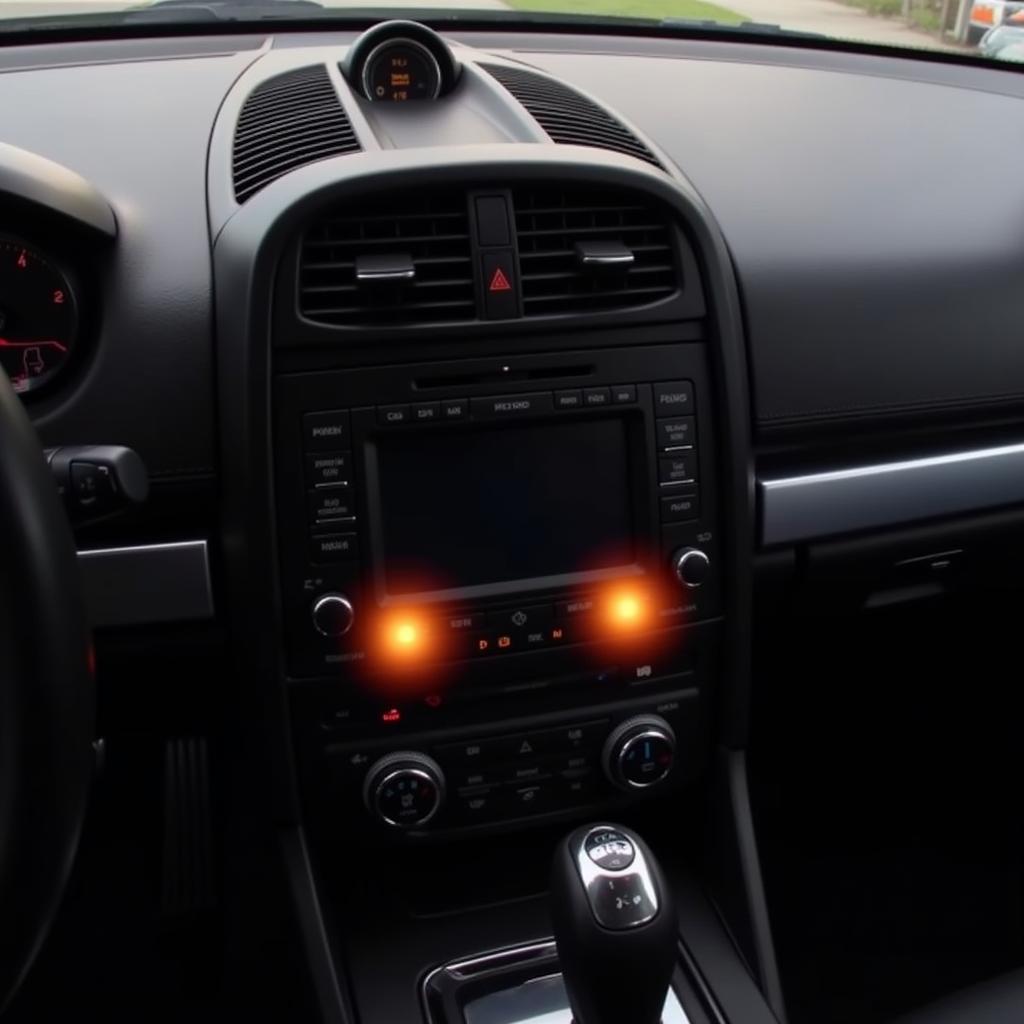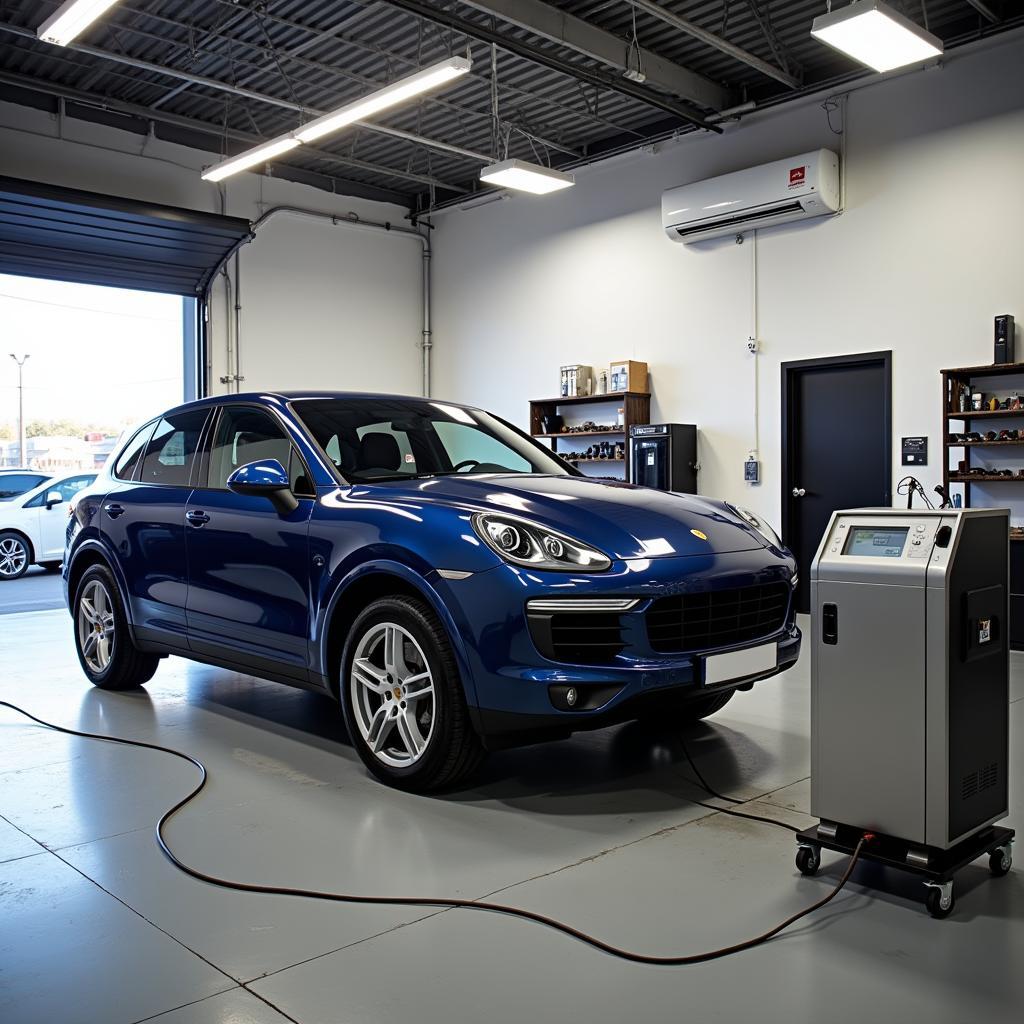Your cart is currently empty!

Troubleshooting Porsche Cayenne Fault Code 0532: A Comprehensive Guide
Experiencing air conditioning issues in your Porsche Cayenne? A “Fault Code 0532” popping up on your dashboard can be a frustrating experience. This code specifically signals a problem with the A/C refrigerant circuit, often indicating low refrigerant levels. This comprehensive guide will break down the possible causes, symptoms, and solutions for Porsche Cayenne Fault Code 0532, empowering you to get your A/C blowing cold again.
Understanding Porsche Cayenne Fault Code 0532
Before diving into solutions, let’s demystify what this fault code actually means. “Fault Code 0532” specifically points to a problem within the A/C system’s refrigerant circuit. Think of this circuit as the veins and arteries of your car’s air conditioning, responsible for circulating the refrigerant that cools the air.
This fault code often, but not always, indicates low refrigerant levels. However, several other culprits might be at play:
- Refrigerant Leak: A leak anywhere in the system, from hoses to connections, can lead to insufficient refrigerant.
- Faulty A/C Compressor: The compressor is the heart of the system, and if it’s not functioning correctly, refrigerant circulation will be compromised.
- A/C Pressure Sensor Malfunction: This sensor monitors refrigerant pressure, and a faulty sensor can send erroneous signals, triggering the fault code.
- Electrical Issues: Wiring problems or a blown fuse within the A/C system can disrupt its operation.
Recognizing the Symptoms
While “Fault Code 0532” itself is a clear indicator, your Porsche Cayenne might also exhibit these telltale signs:
- Warm Air from Vents: The most obvious symptom – instead of cool air, the system blows warm or ambient temperature air.
- Poor Cooling Performance: You might notice a gradual decline in cooling efficiency over time.
- Unusual Noises: Hissing or gurgling sounds from the dashboard area when the A/C is engaged could indicate a refrigerant leak.
- A/C System Cycling On and Off: The system might repeatedly turn on and off in short bursts, struggling to reach the desired temperature.
 Warm air blowing from Porsche Cayenne AC vents
Warm air blowing from Porsche Cayenne AC vents
Troubleshooting and Solutions
Resolving “Fault Code 0532” requires a systematic approach to pinpoint the root cause. Here’s a step-by-step guide:
- Check for Refrigerant Leaks: A visual inspection of the A/C components, especially hoses and connections, might reveal any obvious leaks.
- Inspect the A/C Compressor: Verify that the compressor clutch engages when you turn on the A/C. If not, the compressor itself or related electrical components might be faulty.
- Test the A/C Pressure Sensor: Using a multimeter, check the sensor’s resistance against manufacturer specifications. Readings outside the normal range indicate a faulty sensor.
- Examine Electrical Connections: Inspect all wiring harnesses and fuses associated with the A/C system for any damage, corrosion, or loose connections.
Seeking Professional Help
While some DIY enthusiasts might be comfortable tackling these diagnostic steps, it’s crucial to acknowledge the complexity of modern automotive A/C systems. Refrigerant handling requires specialized equipment and expertise. If you’re unsure about any aspect of the diagnosis or repair, it’s always best to consult a qualified automotive electrician specializing in Porsche vehicles.
“Remember, refrigerant is a hazardous substance. Attempting to recharge the system yourself without proper equipment and knowledge can be dangerous and harmful to the environment,” advises Mark Stevenson, Senior Automotive Technician at German Auto Solutions.
Preventing Future Issues
Once you’ve resolved “Fault Code 0532” and restored your Porsche Cayenne’s cool comfort, consider these preventative measures:
- Regular A/C System Inspections: Integrate A/C checks into your vehicle’s routine maintenance schedule.
- Promptly Address Leaks: Even minor leaks can escalate into major problems. Fix any leaks as soon as they’re detected.
- Run Your A/C Periodically: Even during colder months, running your A/C for a few minutes every couple of weeks helps maintain system pressure and lubricant circulation.
 Porsche Cayenne undergoing AC service
Porsche Cayenne undergoing AC service
Conclusion
“Fault Code 0532” doesn’t have to be a cause for panic. By understanding its implications and following the troubleshooting steps outlined in this guide, you can get to the root of the problem and have your Porsche Cayenne’s A/C system back to its optimal cooling performance. And remember, when in doubt, a qualified Porsche specialist is your best ally.
Need help diagnosing and fixing “Porsche Cayenne Fault Code 0532”? Contact the experts at VCDSTool at +1 (641) 206-8880 and our email address: vcdstool@gmail.com or visit our office located at 6719 W 70th Ave, Arvada, CO 80003, USA. We are here to assist you!
FAQs
1. Can I drive my Porsche Cayenne with Fault Code 0532?
While you technically can drive, it’s not recommended. Ignoring the fault code can lead to further damage to the A/C system and potentially more costly repairs down the line.
2. How much does it typically cost to fix Fault Code 0532?
The cost varies widely depending on the root cause, ranging from a simple refrigerant recharge to a more complex compressor replacement.
3. How often should I recharge my Porsche Cayenne’s A/C system?
A well-maintained A/C system shouldn’t require frequent recharging. If you find yourself recharging more than once a year, it’s crucial to investigate and fix potential leaks.
4. Can extreme temperatures trigger Fault Code 0532?
While extreme temperatures can put additional strain on your A/C system, they aren’t a direct cause of “Fault Code 0532.” The code primarily points to a fault within the refrigerant circuit.
5. Can I use any refrigerant to recharge my Porsche Cayenne’s A/C system?
No, using the wrong type of refrigerant can cause severe damage. Always consult your owner’s manual or a Porsche specialist for the correct refrigerant type.
by
Tags:
Leave a Reply